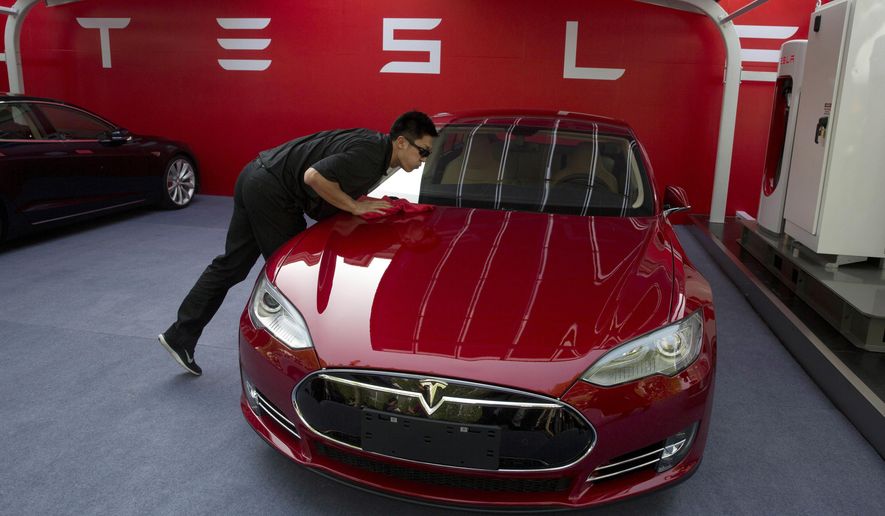OPINION:
Beware of the lame-duck Congress.
With the midterm election behind us, the 115th Congress only has a few legislative days remaining before the new Congress is sworn in. Must-pass items are often left to the lame-duck period, when members are freer to vote as leadership needs, absent the pressure of representing their constituency and defending their votes.
Recently, another legislative boondoggle has appeared on the radar. Retiring Sen. Orrin Hatch, the Utah Republican and outgoing chairman of the Senate Finance Committee, has an expensive idea.
Bloomberg News reported on November 13 that Mr. Hatch said in an interview that “an extension of a tax credit for consumers who purchase an electric vehicle ‘could be’ in a tax-break package” expected during the lame-duck session of Congress.
How do these tax credits work?
The $7,500 electric vehicle tax credit was established in 2008 and phases out once a manufacturer reaches 200,000 fully or plug-in electric vehicles sold in the U.S.
Tesla hit the cap in July of this year. In January 2019, Tesla buyers will only be eligible for half the incentive until June, when the subsidy is again cut in half.
As of October, GM was very close to the 200,000-unit level. Nissan, Ford and Toyota are expected to hit the cap in about two years.
All Americans should want a cleaner environment. Initially, Congress sought to jump-start the electric vehicle industry with this incentive.
But the phase-out concept was also a recognition that once a manufacturer sold a certain amount of product they should be able to close the price gap with traditional, gas-powered cars. Taxpayers cannot fund subsidize their research and development indefinitely.
And more “free money” will not push the automakers to innovate more quickly. Only ending the subsidy will do that.
There is always a cost to manipulating a free market. This tax credit, like all subsidies, artificially picks winners and losers.
The data show that three-quarters of the electric vehicle tax credits are claimed by consumers earning more than $100,000 a year. Should wealthy people be given such a tax break?
If Mr. Hatch gets his way, electric car buyers will still get their credit and the federal treasury will take the hit. The Joint Committee on Taxation estimates that removing the cap on the existing credit would cost $7.5 billion through 2022.
Automakers offer cheap rhetoric to make their case.
They say, “Consumers won’t pay more for electric vehicles!” Well, then, let the free market work.
They say, “Batteries are costing more money!” Then the answer is to pass that cost along to consumers or innovate.
The simple truth is that without these generous tax incentives, electric vehicles would not be as competitive. Their resale value is less. Their range is affected by cold temperatures. They cost more money. Eventually, electric vehicles may be cost-competitive with traditional vehicles. But not today or anytime soon.
Propping up a non-competitive part of the automobile industry wastes taxpayer money and distorts the market.
The goal of the tax reform law that this Republican Congress passed was to end as many special tax breaks as possible. Why would Republicans, on their way out the door, extend a special-interest tax break that primarily benefits wealthy California consumers?
Tesla CEO Elon Musk has said his company does not need tax credits. Indeed, his company made a profit in the most recent financial quarter. Mr. Musk has said that “competitive advantage improves as the incentives go away.”
According to the International Council on Clean Transportation, about half of all electric vehicles sold in the U.S. are sold in California. Congress is effectively enabling a wealth transfer from 49 states to California.
It is important to note that the House-passed version of the tax reform law eliminated the federal electric vehicle tax credit. The Senate bill did not. The compromise that was reached kept the cap at 200,000 vehicles.
Congress should resist the urge to give more free money to the automakers. Let their electric vehicles stand on their own merit.
• Matt Mackowiak is president of Austin, Texas, and Washington, D.C.-based Potomac Strategy Group. He’s a Republican consultant, a Bush administration and Bush-Cheney re-election campaign veteran and former press secretary to two U.S. senators.




Please read our comment policy before commenting.